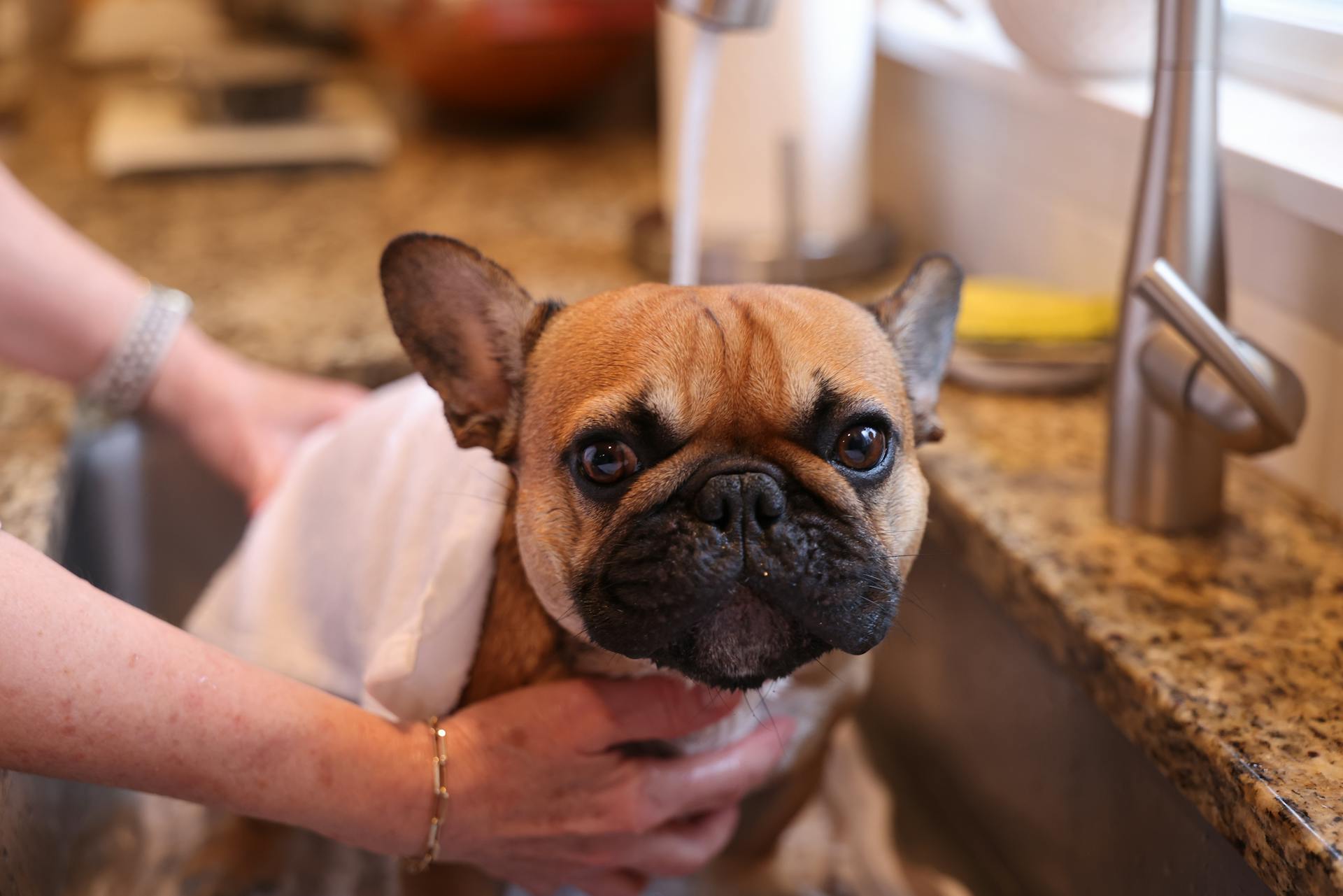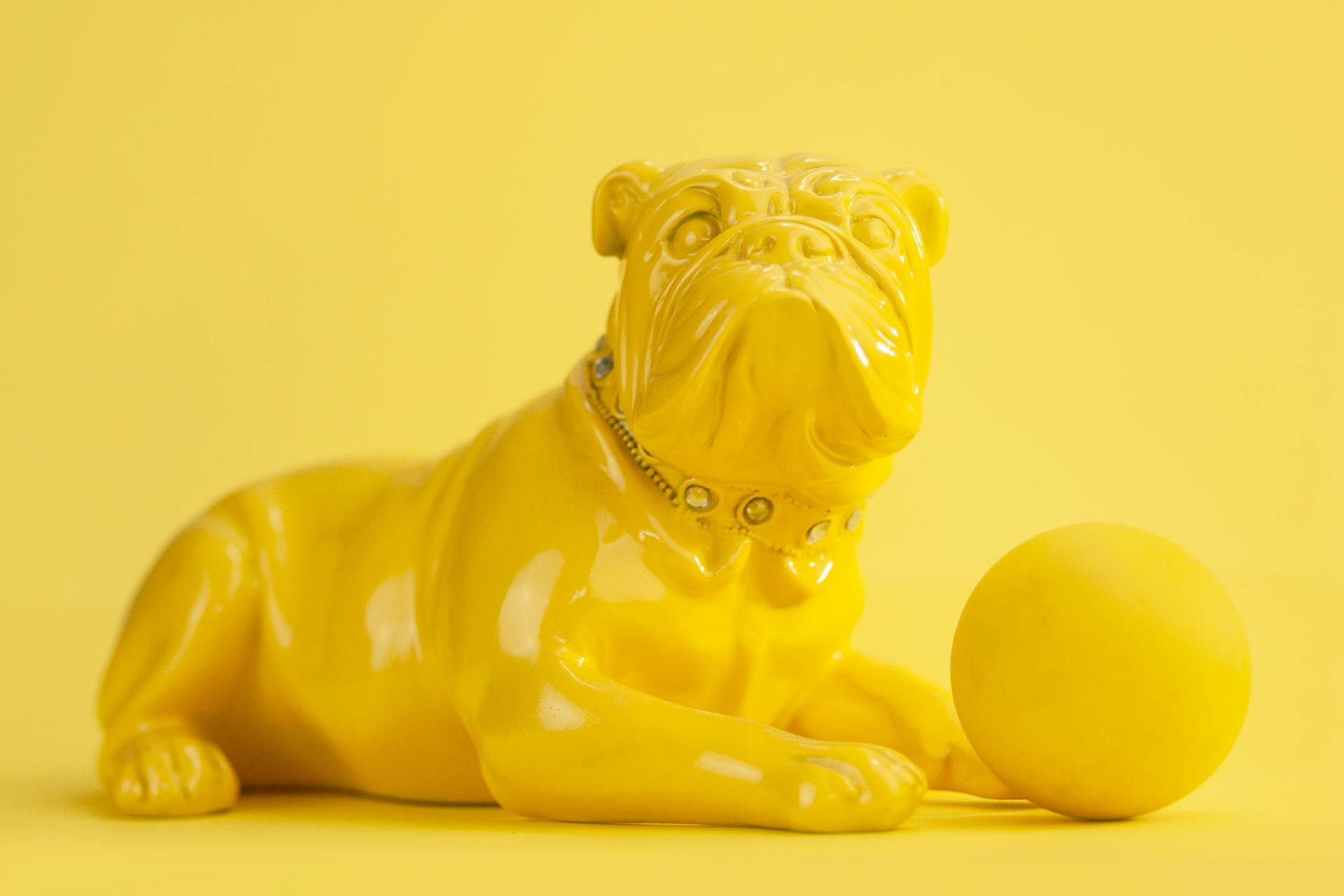
Bulldogs are known for their gentle and affectionate nature, making them a great companion for families and individuals alike. They are often described as laid-back and adaptable.
To ensure a happy and healthy life for your full breed bulldog, it's essential to provide them with regular exercise, which should not exceed 20-30 minutes a day. This is because bulldogs can easily overheat due to their brachycephalic (flat-faced) skull structure.
Full breed bulldogs can weigh anywhere from 40-55 pounds, with a short, easy-to-maintain coat that requires minimal grooming. Their short coats also mean they don't shed much, making them a great choice for those with allergies.
You might enjoy: Great Dane and English Bulldog Mix
Care and Upkeep
Bulldogs require more care than most breeds due to their short muzzle and flattened facial structure. They are prone to overheating, especially in warm environments and under circumstances where they can overexert themselves.
Bulldogs need air conditioning in the home and car to prevent overheating, and owners should travel with fans and ice packs in summer in case of a vehicle breakdown. This is crucial to prevent brachycephalic syndrome, a condition that can obstruct airflow and reduce the dog's ability to cool itself.
Their wrinkly skin requires frequent maintenance to prevent skin infections. To keep their skin clean and dry, owners should gently dry the wrinkles with a soft cloth after bathing or splashing in water.
Bulldogs need little exercise, but owners should curtail outings or shift exercise sessions to cooler times of the day in warm weather. A short daily walk or a robust play session in the house or yard may be all that is needed.
Here are some essential grooming tasks for Bulldogs:
- Brush their coat once a week with a soft bristle brush
- Rinse their skin wrinkles every day to prevent dirt and moisture from getting trapped
- Bathe them once a week to every other week, with special attention to their skin wrinkles/folds
- Trim their nails about once a month
- Brush their teeth every day to keep their teeth and gums healthy
Health and Wellness
Bulldogs are prone to health issues due to their unique physical traits. Their short face and flat facial structure can lead to breathing difficulties.
Bulldogs are at risk of Brachycephalic Obstructive Airway Syndrome (BOAS), which means they don't breathe easily. This can cause them to tire out quickly, overheat in the sun, and breathe and snore noisily.
To help your Bulldog breathe more easily, keeping them at a healthy weight is essential. If their breathing problems are more severe, surgery may be necessary.
Bulldogs are also prone to skin infections in their wrinkly skin. This can be prevented by cleaning and drying their folds every day. Signs of infection include increased itching or scratching, a bad odor, or a greasy or dry coat.
Here are some common health issues that affect Bulldogs:
- Brachycephalic Obstructive Airway Syndrome (BOAS)
- Skin infections
- Eye issues
- Hip dysplasia
Maintaining a Bulldog's coat is relatively simple, requiring only occasional brushing and bathing. However, their wrinkles can remain damp, leading to bacteria and yeast infections. To prevent this, keep their wrinkles clean and dry.
Curious to learn more? Check out: English Bulldog Wrinkle Care
Ear Care
Ear Care is crucial for your Bulldog's overall health.
Their characteristic wrinkles can lead to skin problems, but ear infections are also a concern if not properly cared for.
After every bath, clean your Bulldog's ears with a veterinary-recommended cleaner to prevent ear infections.
Regular ear cleaning will keep your Bulldog's ears healthy and happy, just like their owners.
Health Issues
English Bulldogs are prone to several health issues due to their unique physical characteristics. Their short muzzle and flattened facial structure can lead to breathing difficulties, overheating, and skin problems.

One of the most common health issues in Bulldogs is Brachycephalic Obstructive Airway Syndrome (BOAS), which affects their ability to breathe easily. This condition is caused by a combination of anatomical abnormalities, including narrowed nose openings, elongated soft palate, and compressed nasal passages.
Bulldogs are also prone to skin infections, particularly in their wrinkly skin folds. To prevent this, it's essential to clean and dry their skin folds daily. Signs of infection may include increased itching or scratching, bad odor, or a greasy or dry coat.
Hip dysplasia is another common health issue in Bulldogs, where the hip joint doesn't form properly, leading to looseness, pain, and arthritis. This often-genetic condition can be treated with joint supplements, pain medication, and surgery in severe cases.
Here are some common health issues in Bulldogs:
- Brachycephalic Obstructive Airway Syndrome (BOAS)
- Skin infections
- Hip dysplasia
- Eye issues
- Obesity
To prevent or manage these health issues, it's crucial to provide regular care and attention to your Bulldog's unique needs. This includes keeping them at a healthy weight, cleaning and drying their skin folds, and providing a high-quality dog food suitable for their size and age.
By being aware of these potential health issues and taking proactive steps to prevent or manage them, you can help your English Bulldog live a happy and healthy life.
Check this out: Healthiest Bulldog Breeds
Nutritional Tips
As you're considering bringing a full breed bulldog into your family, it's essential to think about their nutritional needs. Bulldogs are prone to obesity, so it's crucial to find the right diet for them.
Their flat, pushed-in face can lead to breathing difficulties, which can trigger digestive issues like vomiting, gagging, or regurgitation. To lessen these issues, feed your bulldog small amounts at a time.
Choose a high-quality commercial dog food that meets the nutritional standards of the Association of American Feed Control Officials (AAFCO). Look for the AAFCO statement on the package.
Bulldogs can be greedy eaters, so portion control is key. Feed your pet a high-quality food and always follow the portion guidelines on the packaging.
Here are some additional nutritional tips to keep in mind:
- Consider adding dog supplements like omega-3 fatty acids, joint supplements with glucosamine, probiotics, and immune-boosting supplements to maintain your bulldog's overall health.
- Be mindful of treats, as they should never make up more than 10% of your bulldog's daily intake.
- Talk to your vet about an appropriate feeding schedule for your bulldog and their individual needs.
Remember, bulldogs are slow to mature, so bear this in mind when moving from puppy food to adult food. Consult your vet if you're unsure.
Training and Behavior
Training a Bulldog requires patience and positive reinforcement. Use treats, cuddles, and special toys to reward your Bulldog for listening.
Bulldogs can learn all the important commands, such as sit, come, stay, and leave it, but they may not pick up lots of tricks. They respond best to positive reinforcement training, but be mindful of treats, as they can lead to unwanted weight gain.
Training sessions should be fun and kept short, with plenty of positive reinforcement. Bulldogs have a stubborn streak, so you may need to ask a few times before they respond.
Bulldogs need daily exercise, but it should be limited to prevent overheating. They prefer short, leashed walks in a cool environment, around 10-15 minutes at a time.
Here's a summary of exercise guidelines for Bulldogs:
Bulldogs are sociable and laid-back, but they can be strong-willed. They'll pause before responding to commands, weighing up what's in it for them.
Bulldogs are great companions and family pets, but they can be resolute and stubborn. They require high-value treats to encourage learning, especially for commands like "sit", "stay", and "leave it."
Bulldogs are not natural swimmers and should be kept away from water. They're also not barker, but their fierce expression may scare off intruders.
Exercise
Exercise is a must for Bulldogs, but they need it in moderation. Bulldogs aren't built for long-distance running and can get overheated easily.
A 30-minute daily exercise routine is sufficient for Bulldogs, split into two 15-minute sessions to prevent overexertion. You can also add short play sessions at the dog park or with doggy playdates.
Bulldogs love to run around in circles, but it's best to save this energy for cooler parts of the day. Avoid exercising your Bulldog in hot weather to prevent heatstroke.
In addition to physical exercise, Bulldogs need mental stimulation. Try offering dog puzzles or playing a quick game of tug-of-war to keep them engaged.
Here are some fun activities for Bulldogs:
- Walks
- Backyard and indoor play
- Tug-of-war
- Cuddling and snoozing
Remember, Bulldogs are laid-back and easily pleased, so they're happy with short, fun exercise sessions. Just be sure to provide plenty of water and shady spots to escape the heat.
General Information
Full breed bulldogs are known for their distinctive physical appearance, which is the result of selective breeding for a specific look.
They typically weigh between 40-55 pounds and stand between 10-14 inches tall at the shoulder.
Their short, easy-to-maintain coats require minimal grooming.
Bulldogs are often described as laid-back and affectionate, making them a popular choice as family pets.
Frequently Asked Questions
How much is a full blooded bulldog?
The cost of a full-blooded English Bulldog typically ranges from $1,500 to $4,000. If you're curious about what makes this breed so expensive, keep reading to learn more.
What 2 breeds make a bulldog?
The English bulldog is a cross between the Asiatic mastiff and the pug. This unique ancestry is responsible for their distinctive characteristics and fearless nature.
What does a full grown English bulldog look like?
A full-grown English bulldog stands between 12 and 16 inches tall, with a short, smooth coat in various colors including white, fawn, red, and brindle. They often feature distinctive markings such as white markings, piebald markings, and black masks.
Featured Images: pexels.com


